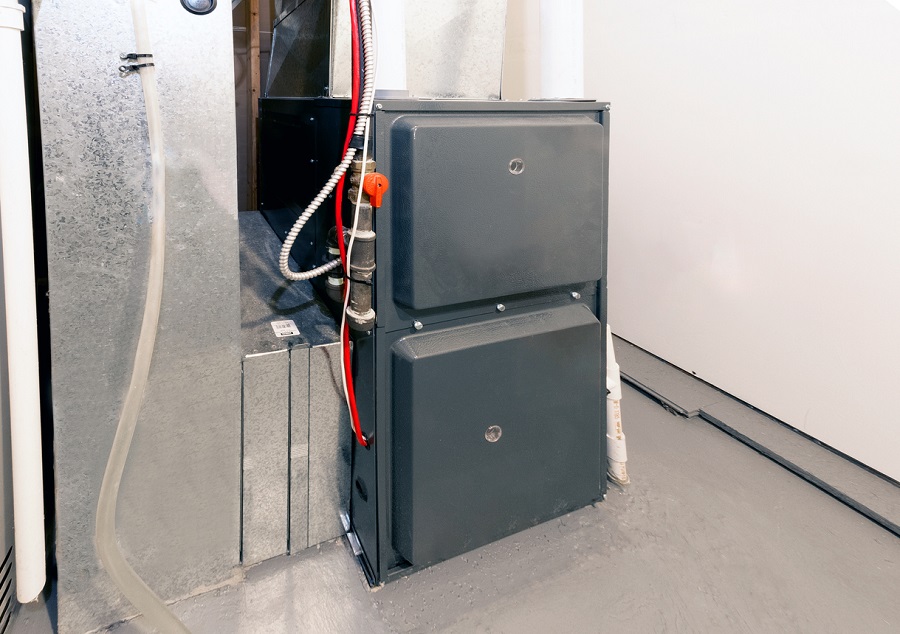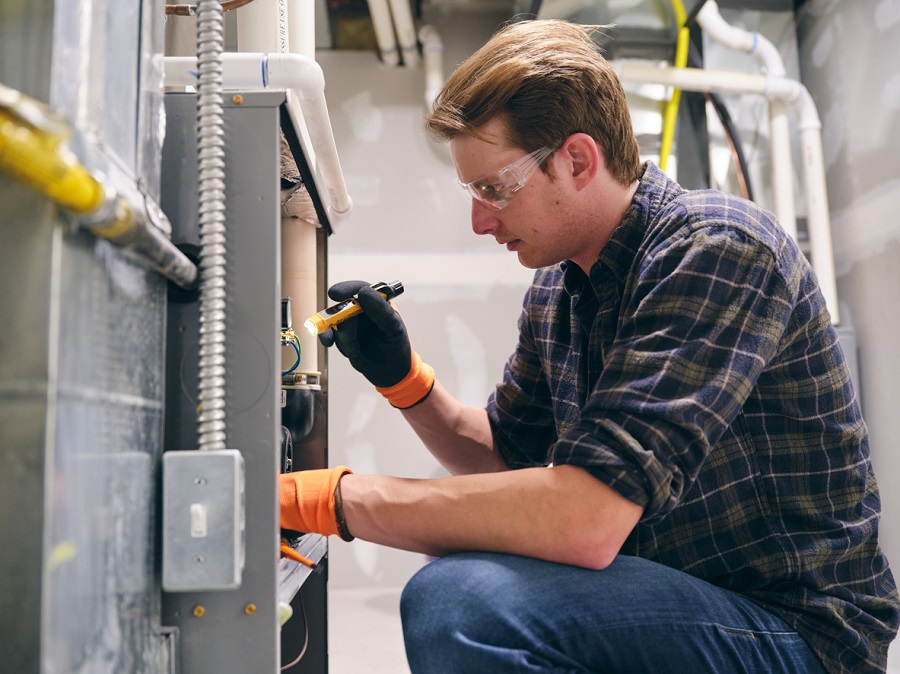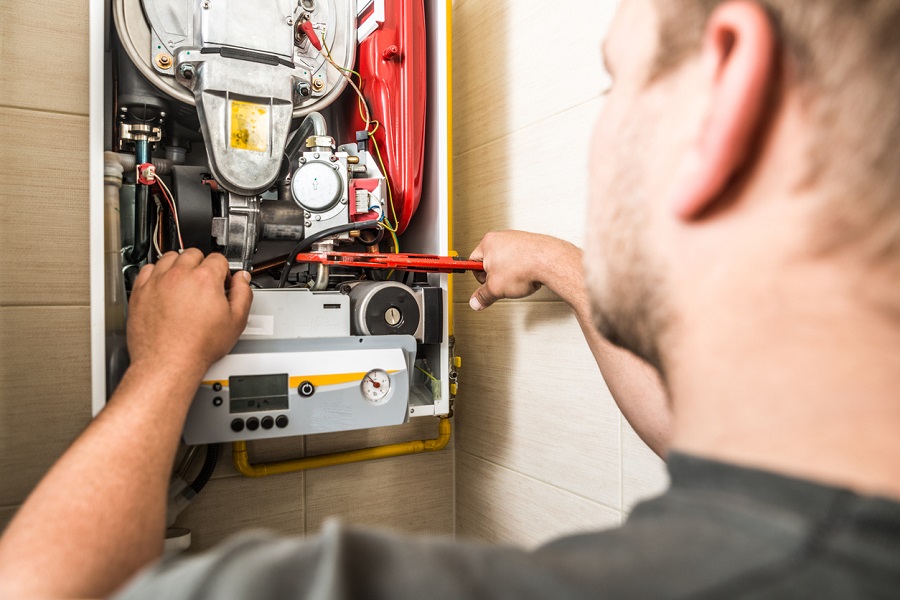Gas vs Electric Furnace -The Main Differences in 2022
Both gas and electric furnaces provide heating to your home, but what’s the difference between them, and which is right for you? Today we will explore their positives and negatives and determine the right fit for your home.
What is the difference between gas vs electric furnaces?
The primary difference between a gas and an electric furnace is that gas furnaces use burners fed by natural gas. An electric-powered furnace uses heated coils to supply heat. Natural gas produces emissions expelled through the exhaust, whereas an electric furnace does not produce any byproducts.

What is a Furnace, and how does it work?
A furnace converts fuel into heat, which is distributed in your home. All furnaces consist of four primary components: a burner, heat exchangers, a blower, and a flue that functions as an exhaust. First, fuel is ignited in the furnace’s burner, usually natural gas or propane. The flames heat up the metal heat exchanger, and the exhaust flows out. The heat exchanger then transfers heat to the incoming air, and the furnace’s blower forces the heated air into the ductwork, which then distributes it throughout the home.
Electric Furnace Pros and Cons
An electric furnace is ideal if you live in a more rural area as they are safe, quiet, and easier to install. However, there are a few cons to be aware of:
Pros
Cheaper/easy to install
Electric furnaces are cheaper and easier to install as they do not require external elements such as a gas line or ventilation. The result is that electric furnaces are usually half or three-quarters the price of a gas furnace.
Easier maintenance
Electric furnaces require less maintenance than gas furnaces as they have fewer components to contend with. Gas furnaces requires ventilation infrastructure and a gas line to function, whereas an electric furnace can simply be connected to your home’s power.
Safer and quieter
Electric furnaces do not have carbon monoxide risks and run much quieter than gas furnaces. Carbon monoxide can cause loss of consciousness and is harmful when inhaled. In addition, the presence of carbon monoxide can also increase the risk of fire as it is very flammable.
Longevity
Electric furnaces have almost double the longevity of a gas furnace because of the fuel they expend. Gas furnaces produce carbon monoxide as a byproduct and will slowly dirty up your furnace. If left ignored, this can shorten the lifespan of the furnace. Electric furnaces, on the other hand, do not require heavy maintenance and will generally last twice as long.
Cons
Higher fuel costs
Fuel costs are much higher for electric furnaces and will be much more expensive to run. The result is a higher energy bill per month, so it is recommended that your electric furnace be used sparingly.
Less heat efficient
Electric furnaces provide heat much slower than gas furnaces and will take longer to heat your home. However, gas furnaces are much more heat efficient, reaching a higher temperature quicker, allowing them to heat a house twice as fast as an electric furnace.
Gas Furnace Pros and Cons
Gas furnaces provide heat quickly and are reliable, but they have a few drawbacks as well:
Pros
Higher heat efficiency than electric
Gas can heat air faster than electricity and is more reliable during freezing temperatures. Electric furnaces can provide heating and cooling through a heat exchanger, which is versatile but slow. A gas furnace burns fuel to heat the burner, providing hot air through the gas exchanger, allowing it to achieve a higher temperature faster.
Lower fuel costs
Gas costs less than electricity to run, meaning a gas furnace can save you more on energy bills every month. Gas furnaces can achieve a high temperature quickly, which means you need to burn less fuel to stay comfortable. On the other hand, an electric furnace will need to run a great deal longer to provide the same heat level, which will spike your energy bills.
Reliable
A gas furnace can provide reliable heating regardless of the weather outside. A gas furnace operates by burning fuel to achieve its target temperature, making it ideal for cold environments because the process is simple and reliable. An electric furnace works by pulling air from outside and converting it to the desired temperature. This process can cause problems when the fan is clogged or parts of the furnace freeze.
Cons
Expensive/difficult to install
Gas furnaces are more expensive to install when compared to electric furnaces as they require more external elements, such as a gas line and a ventilating system. For reference, a gas furnace is roughly 50% more expensive than an electric furnace. Additionally, the ductwork required will take up a large amount of space and can be cumbersome to install.
Noisy compared to an electric furnace
Gas furnaces are a great deal noisier to run because of the extra exhaust fans. This noise can be disruptive to your home compared to a quiet electric furnace.
Requires professional maintenance
Gas furnaces require more frequent inspections due to the fuel they burn, which leaves behind contaminants that will need to be cleaned. Their additional components, such as ventilation ducts and a gas line, must have maintenance performed every few months to ensure home safety and prevent gas leaks or dirty ventilation.
Carbon monoxide safety concerns
Gas furnaces produce harmful environmental emissions, which can be dangerous to your home if left ignored. Carbon monoxide is hazardous if inhaled, and large quantities of the gas can be fatal. Regardless of the make and model or how well you maintain a gas furnace, it will always produce a small amount of carbon monoxide, so it’s essential to keep your furnace well-maintained.

Detailed Differences Between Electric and Gas Furnaces
Energy efficiency
Gas furnaces are much more energy efficient than electric furnaces. The power behind a gas furnace allows it to heat an area quickly, whereas electricity requires more time to provide the same heat, wasting more energy.
Cost
Electric furnaces are the more affordable option as they do not require a gas line to install. However, the lower initial cost is offset by the energy costs, as electric furnaces are more expensive to run than gas furnaces.
Safety
Electric furnaces are much safer as there is no risk of carbon monoxide poisoning or any danger of natural gas leaking.
Cold Weather effectiveness
Electric furnaces have difficulty operating efficiently during cold weather, and it may take a while to provide heat to an entire house. Gas furnaces are more reliable and offer a large amount of heat to your home, regardless of the outside weather conditions.
Noise
Electric furnaces are much quieter than gas furnaces which can be disruptive to your home when operating.
Lifespan and maintenance
Typically, an electric furnace will last much longer than a gas furnace due to the fuel type that is used. Additionally, an electric furnace will require much less maintenance as there are fewer moving pieces. A gas furnace will require consistent inspections for gas leaks and other component malfunctions.
How to tell which type of furnace is in your home
Before checking your furnace, first:
- Read labels
- Check for a gas line
- Locate the exhaust vent
- Go over to your thermostat and turn up the temperature on your forced air heating system. You need to have warm air circulating to check whether your furnace is gas or electric-powered.
- Go to where your heating system is located. This is usually in a closet or wall. You should be able to see metal ducts going in and out of your heating unit.
- If it is a gas furnace, there will be a small window on the front of the furnace where you should see a glowing blue flame. You should also be able to hear the noise from the gas burner. Electric-powered furnaces do not have a glass window with a blue flame and do not make any noise when idle.
Which lasts longer- Electric vs Gas furnace?
An electric furnace can expect to last anywhere from 15-20 years, whereas a gas furnace has the lowest life expectancy of 10 years. A furnace’s longevity is determined by the maintenance it receives and its power source.
Calculating which is the best for you
To calculate your heating cost, you factor in your furnace size by the BTU or how much heat is required to heat a pound of water. Then you add the heat pump size by ton, then the heat pump HSPF efficiency rating. Then you add in your state to determine the climate, then add in yearly heating hours which uses data by the US Department of Energy to determine average outdoor temperatures. Finally, we use electric and natural gas prices to calculate our final cost, which you can find here.
Overall – which is better for you?
So, which is better for your home? Gas furnaces are the better choice if you experience freezing winters and use your heater frequently. Electric furnaces are the better option if you live in a more temperate area and you don’t use your heater that often. Give us a call for installation advice tailored to your home or business.
Hire Fix-it 24/7 for professional heating installation
If you want to install a heat pump or furnace in your home, contact Fix-it 24/7. Our expert technicians are available 24 hours a day, including weekends and holidays, and will alleviate any stress with your heating installation, maintenance, or repair. In addition, we will ensure your unit is installed correctly and help you choose the right model that perfectly suits your comfort and budget requirements. Follow the links below for more information on our heating services:


